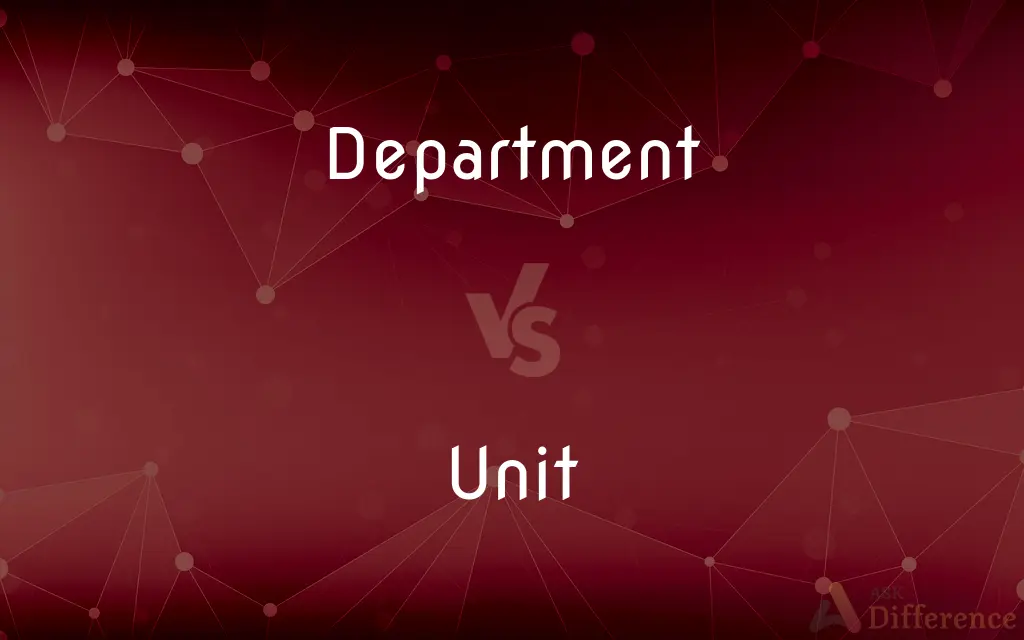Department vs. Unit — What's the Difference?
By Tayyaba Rehman & Fiza Rafique — Updated on February 23, 2024
A department is a larger organizational segment with a broad function, while a unit is a smaller subset focused on specific tasks within a department.

Difference Between Department and Unit
Table of Contents
ADVERTISEMENT
Key Differences
Departments are significant divisions within organizations, encompassing a wide range of functions related to a specific area of the business or institution. For example, the Marketing Department focuses on market research, advertising, and sales strategies.
Units are smaller entities within departments, concentrating on particular aspects of the department's overall function. A Social Media Unit within the Marketing Department might specialize in social media campaigns and engagement.
The scope of a department is broader, often defined by its strategic role in the organization's overall objectives. It has more resources, a larger staff, and a wider range of responsibilities compared to a unit.
Units are characterized by their specialized focus, working on specific projects or tasks. They have a narrower scope and are typically more focused on the details and execution of particular activities within the broader departmental goals.
Departments are managed by heads or directors who oversee their entire range of operations, units are usually led by managers or supervisors who report to the department head and focus on specific operational aspects.
ADVERTISEMENT
Comparison Chart
Scope
Broad, covering a major segment of the organization
Narrow, focusing on specific tasks
Function
Manages a wide range of activities within its scope
Concentrates on particular aspects of departmental functions
Size
Larger, with more employees and resources
Smaller, with fewer employees focused on specific tasks
Leadership
Headed by a director or department head
Led by a manager or supervisor
Role in Organization
Strategic, contributing to overall goals
Operational, focusing on detailed execution of tasks
Compare with Definitions
Department
A division within an organization dedicated to a specific function.
The Finance Department handles all financial transactions and planning.
Unit
A distinct component of a complex system.
Each air conditioning unit in the building is independently controlled.
Department
A major administrative section of a government.
The Department of Education sets educational standards and policies.
Unit
A smaller, specialized group within a department focused on specific tasks.
The Research and Development Unit creates new product prototypes.
Department
An academic division in a university focusing on a specific field of study.
The Department of Biology offers courses in life sciences.
Unit
A measure of quantity that serves as a standard.
The unit of measurement for length in the metric system is the meter.
Department
A territorial and administrative division in some countries.
Colombia is divided into departments, each with its own local government.
Unit
A single residence within a larger building complex.
She rents a two-bedroom unit in the downtown apartment complex.
Department
A division of a large organization such as a government, university, or business, dealing with a specific area of activity
The council's finance department
Unit
A military subdivision designed for specific operations.
The Special Forces Unit was deployed for a reconnaissance mission.
Department
A principal administrative division of a government
The department of public works.
Unit
An individual, group, structure, or other entity regarded as an elementary structural or functional constituent of a whole.
Department
A division of a business specializing in a particular product or service
The personnel department.
Unit
A group regarded as a distinct entity within a larger group.
Department
A division of a school or college dealing with a particular field of knowledge
The physics department.
Unit
An organization regarded as part of a larger social group;
The coach said the offensive unit did a good job
After the battle the soldier had trouble rejoining his unit
Department
Department One of the principal executive divisions of the federal government of the United States, headed by a cabinet officer.
Department
One of the principal divisions of executive government
The Treasury Department; the Department of Agriculture; police department
Department
A specialized division of a large organization;
You'll find it in the hardware department
She got a job in the historical section of the Treasury
Department
A segment of a large store or company specializing in a particular type of product.
The Home Appliances Department sells kitchen and laundry appliances.
Common Curiosities
What is the main difference between a department and a unit?
A department is a larger division with a broad scope, while a unit is a smaller, specialized group focusing on specific tasks within a department.
How does the leadership structure differ between departments and units?
Departments are typically led by heads or directors, whereas units are managed by managers or supervisors who report to the department head.
Can a person work in a unit without being part of a department?
No, since units are subsets of departments, individuals working in a unit are also considered part of the broader department.
Is the size of a department always larger than a unit?
Yes, departments are broader in scope and size, encompassing several units within them.
Are units more focused on strategic or operational tasks?
Units are more focused on operational tasks, concentrating on the execution of specific projects or activities.
Do departments and units have different budgeting processes?
Generally, departments have larger budgets encompassing all its units, but units may manage their specific budgets within the departmental allocation.
Can a unit operate independently of a department?
No, units are integral parts of departments and focus on specialized tasks within the broader departmental scope.
Are the terms 'department' and 'unit' interchangeable?
No, the terms are not interchangeable; they represent different levels of organization within a company or institution.
How do units contribute to the goals of a department?
Units specialize in detailed aspects of the department's function, contributing to overall goals through focused tasks and projects.
How does communication flow between departments and units?
Communication flows from department leadership down to units and vice versa, ensuring alignment with overall goals and specific tasks.
Can a department exist without any units?
Yes, some departments may operate without distinct units, especially in smaller organizations or specific contexts.
Do departments and units vary significantly across industries?
Yes, the structure, function, and naming of departments and units can vary widely across different industries and sectors.
How are departments and units created within an organization?
They are established based on the organization's operational needs, strategic goals, and scope of work.
Do all organizations have both departments and units?
Not necessarily. The structure depends on the organization's size, complexity, and needs.
Can a unit have sub-units?
In large organizations, units can have sub-units focusing on even more specific tasks, though this is less common.
Share Your Discovery

Previous Comparison
Geography vs. Demography
Next Comparison
Bank vs. CliffAuthor Spotlight
Written by
Tayyaba RehmanTayyaba Rehman is a distinguished writer, currently serving as a primary contributor to askdifference.com. As a researcher in semantics and etymology, Tayyaba's passion for the complexity of languages and their distinctions has found a perfect home on the platform. Tayyaba delves into the intricacies of language, distinguishing between commonly confused words and phrases, thereby providing clarity for readers worldwide.
Co-written by
Fiza RafiqueFiza Rafique is a skilled content writer at AskDifference.com, where she meticulously refines and enhances written pieces. Drawing from her vast editorial expertise, Fiza ensures clarity, accuracy, and precision in every article. Passionate about language, she continually seeks to elevate the quality of content for readers worldwide.













































